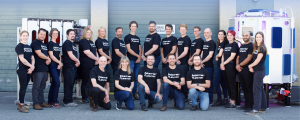
Industrial Plankton Inc. designs and manufactures turnkey bioreactors in Canada for clean, on-site, live algae production for aquaculture, research lab, and biotechnology uses. Photo credit: industrialplankton.com
VICTORIA – Industrial Plankton Inc. is receiving $900,000 to establish a new manufacturing facility for its energy-efficient bio-reactors.
The funding for Industrial Plankton was part of the $3.5 million in funding from the Pacific Economic Development Agency of Canada (PacifiCan) announced this week for eight organizations based on Vancouver Island.
Industrial Plankton produces algae and seaweed to feed shellfish for human consumption and ocean restoration projects. This investment will expand Industrial Plankton’s production capacity, boost sales and create jobs, all while advancing environmental sustainability.
Industrial Plankton Inc. delivered its first shipping container hatchery to a customer two years ago. Founded in 2010, the company designs and manufactures turnkey bio-reactors in Canada for clean, on-site, live plankton production for aquaculture, research lab and bio-technology uses.
In a recent Business Examiner article, CEO Robert Roulston reported the company expanded to new premises at 3374 Burns Avenue to allow it to keep up to customer demand, as their bio-reactors are now used in 26 countries around the world.
Their first commercial 1000L Algae bioreactors were installed in 2012. Since then, they’ve launched the 100L Research Algae bioreactor, PBR 1250 L – which doubles phytoplankton production from the initial PBR 1000L unit, and the large-volume 2500 Dual Algae bioreactor.
Industrial Plankton’s technology is optimized for reliability, ease of use, and biosecurity, and their equipment is highly automated, increasing reliability and saving operators countless hours. The result is equipment that is capable of easily and reliably producing bio secure, high-density algae.
Algae are an important biotech feedstock for pharmaceuticals, nutraceuticals, omega-3 oils, carotenoids, pigments, and biofuels, and used in waste remediation to sequester nutrients, heavy metals, and greenhouse gases.
They’ve worked with customers from shellfish, shrimp, and finfish hatcheries for years to help improve their algae cultures. Their equipment is used to feed many aquacultured invertebrates including larval and juvenile mussels, clams, oysters, white legged shrimp, scallops, sea cucumbers and many more. Applications in rearing larval finfish include greenwater generation, and enriching zooplankton to feed rotifers, copepods and artemia.
Other businesses receiving funds include:
Open Ocean Robotics: $800,000 to allow Open Ocean Robotics to increase production of its Uncrewed Surface Vehicles, which are solar-powered, autonomous boats that provide real-time ocean information. This technology helps researchers monitor ocean conditions and track marine life in challenging environments, making it safer, easier and more affordable to protect our oceans. Last week, the company won the Autonomous System Award at BlueTIDE, the annual Technology In-Water Demonstration event hosted by 401 Tech Bridge and the Naval Underwater Warfare Centre (NUWC).
Fluorescent Design: $569,000 that will enable the e-commerce company to develop new, innovative apps and enhance existing ones. Fluorescent Design produces templates and apps that clients can use on Shopify, an online storefront for businesses.
Namgis Business Development Corp.: $252,000 to help establish a community-owned driving school that provides Insurance Corporation of British Columbia (ICBC) certified driver training and licensing for Indigenous community members. The program will serve 12 remote communities, where residents would have previously needed to travel about 200 km to the closest ICBC-certified school
Alder Bay RV Park and Marina: $250,000 to help expand Alder Bay RV Park and Marina in Port McNeill. This expansion will include critical infrastructure upgrades needed for installation of up to 14 made-in-B.C. mobile cottages.
Canadian Amateur Rowing Association: $250,000will help develop the new National Training Centre at Lake Quamichan, transforming it into a premier rowing and sports tourism hub and launching the Cowichan Valley as Canada’s destination for local, national and international rowing regattas. The Centre will also be the first purpose-built para-rowing facility, providing accessible opportunities for athletes and tourists, and will host other water activities including Indigenous canoeing and kayaking.
City of Port Alberni: $248,000 to create a vibrant market with an Indigenous focus and outdoor performance space at the Clutesi Haven Marina Uplands in Port Alberni. In partnership with the Hupačasath and Tseshaht First Nations, the City of Port Alberni will transform the site into a unique cultural experience that encourages visitors to extend their stay in the region and creates business opportunities for Indigenous entrepreneurs.
Métis Provincial Council of British Columbia: $250,000 will help transform the Point Ellice House, a national and provincial historic site, into an Indigenous reconciliation tourism experience.
Business Examiner Staff

